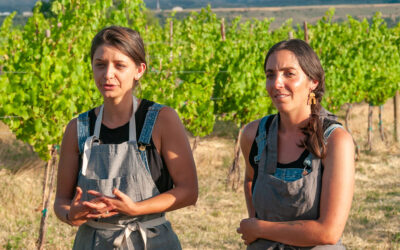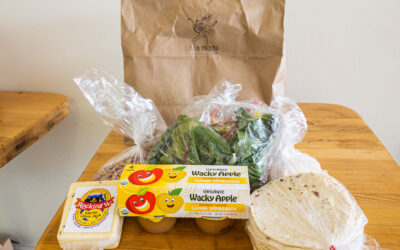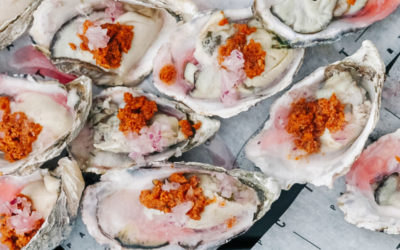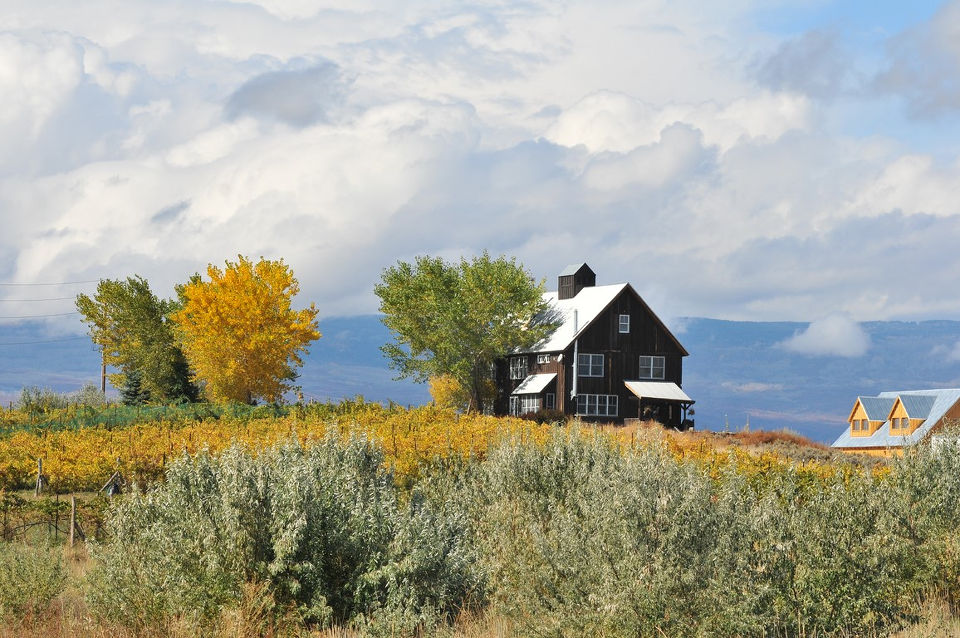
The Hanson’s home at Jack Rabbit Hill Farm. Photograph: Peak Spirits
It’s a damp, dismal, late October day in Hotchkiss, but that doesn’t alter the fact that Jack Rabbit Hill Farm—the 70-acre biodynamic (BD) vineyard and distillery owned by Lance and Anna Hanson—is stunning. Their wood-and-rock house-cum-tasting room (a new, dedicated tasting room above the distillery will open around Thanksgiving) is perched overlooking the grapevines and neighboring fruit orchards; when I knock on the front door, a farm dog and a plump Plymouth Rock chicken stand guard, seeking shelter from the rain.
Lance shows me inside, and we begin discussing hard ciders made with apples and pears—the newest products from the farm’s distillery brand, Peak Spirits. The Hanson’s have already made a national name for themselves with their CapRock Organic Eaux de Vie (brandies), Gin, and Vodka, made with wine grapes.
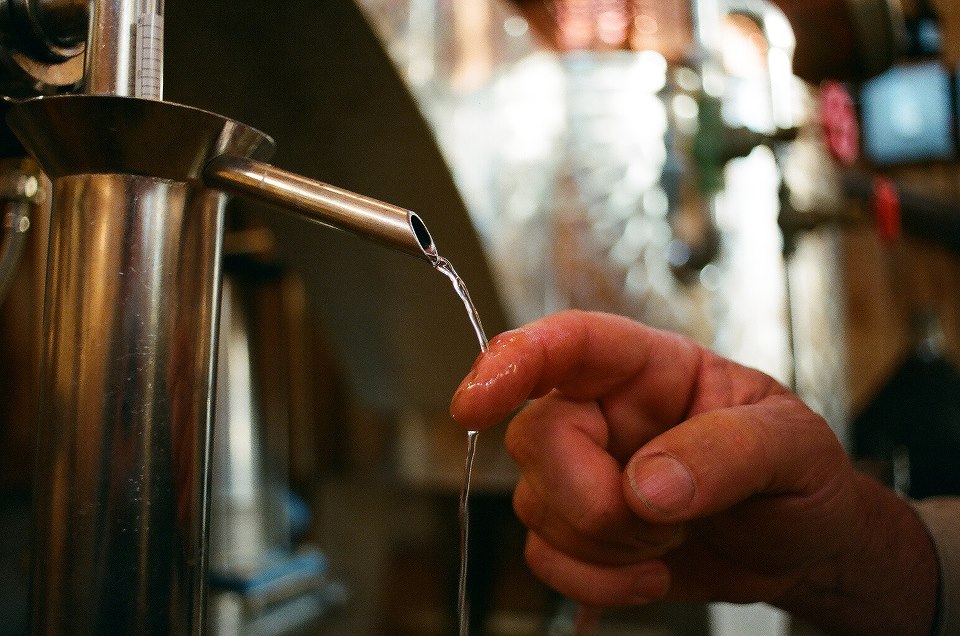
The gin is also made from crushed apples. Photograph: Peak Spirits
In July, the Jack Rabbit Hill team released their first cider under the New Avalon brand name, made with Jonathan, Braeburn, and Winesap apples from nearby Ela Family Farms. I first tried the cider at Sustainable Settings’ annual Harvest Festival, and was immediately intrigued by its crisp, faintly effervescent quality, light body, and subtle aromatics. For anyone who’s ever choked down a cloyingly sweet or overbearingly acidic hard cider, Peak Spirits’ New Avalon Pale Cider comes as a revelation.
That’s exactly as it was intended, says Lance. “I think we’re taking a different approach than other cider makers, informed by our wine and spirits making, and that’s driving our cider program. We want to offer consumers what they get from a great wine or spirit: great aroma, mouthfeel, finish, complexity, and compatibility with food.”
The approach Lance is referring to is their method of using the whole fruit—skins, seeds, and all—in the New Avalon Cider production process. Most cider producers first press the whole fruit to make juice and then ferment the juice to make cider. Explains Lance, “Our mission has always been about showcasing the purity and natural goodness of well-grown, expressive fruit. Whole fruit fermentations help us do that, whether we’re making cider, wine, brandy, gin, or vodka.”
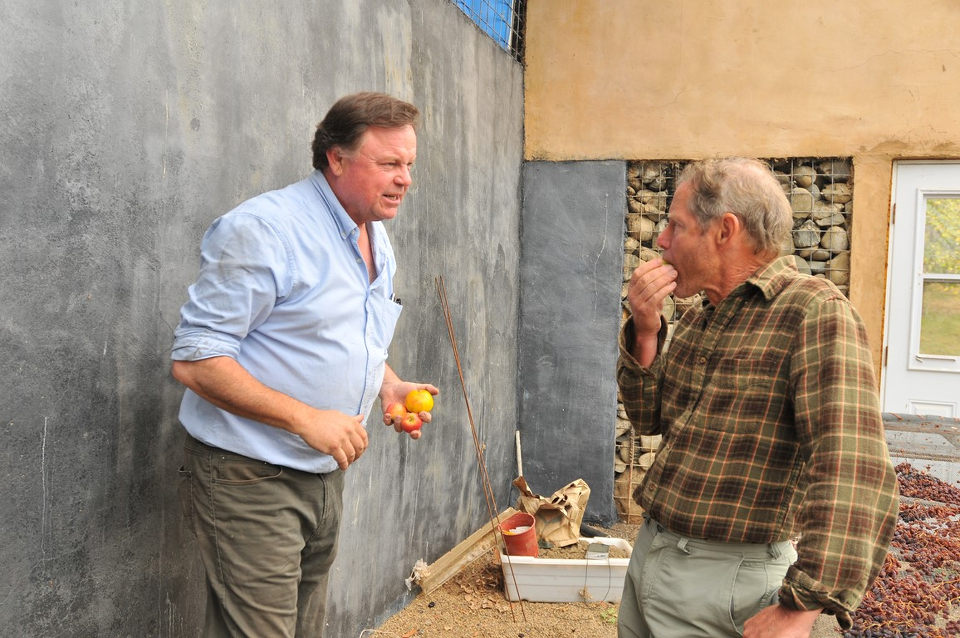
Lance and Christ Tebbutt of Filigreen Farm talk apples. Photograph: Peak Spirits
During my visit, the farm crew was working on one of their 2015 ciders, which is made with Demeter-certified biodynamic apples from Filigreen Farm in Northern California’s remote Anderson Valley. Explains Hanson, “We’re big supporters of the best growers in our valley, but our volume requirements are starting to exceed what we can get locally. The folks at Filigreen are world-class growers with exceptional farming practices and fruit. We stand to gain so much from them, and not just in terms of excellent apples. They can show us a lot in terms of effective, low-input farming practices.”
New Avalon Organic Pale Cider is available at the following Roaring Fork Valley locations: Cooper Wine & Spirits, Sopris Liquor and Wine, Roaring Fork Liquors, Four Dogs Fine Wines & Spirits, and Town Carbondale. New Avalon Organic Pear and Filigreen Biodynamic Ciders will be released in time for Thanksgiving; contact Anna Hanson at anna@jackrabbithill.com for more information and availability.
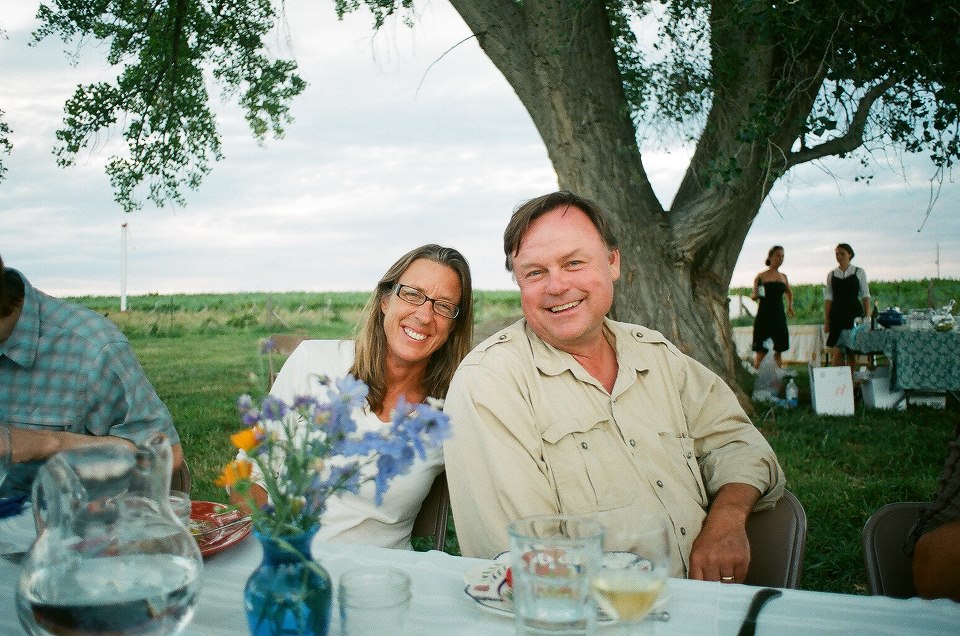
The Hanson’s at rest. Photograph: Peak Spirits
Pears Poached with Cider & Bay
Renown British chef Hugh Fearnley-Whittingstall created the following recipe, which seems the very essence of late fall. Feel free to experiment with other herbs and spices in the poaching liquid; I like using star anise, vanilla, and ginger.
Serves 4
4 pears
1/3 cup sugar
2-3 strips lemon peel
4-5 bay leaves, torn in half
1 ¼ cups dry hard cider
1. Peel the pears, but leave them intact. Put them in a saucepan into which they will fit fairly snugly in one layer. Add the sugar, lemon zest and bay leaves. Pour over the cider, then add enough water just to cover the pears. Bring to a simmer, cover and simmer until the pears are tender—the time this takes can vary greatly depending on the ripeness of the pears; it could be five minutes for ripe pears, or 25 for very firm ones, so keep checking them with the tip of a small, sharp knife.
2. When the pears are done, remove them from the pan with a slotted spoon and place in a dish. Turn up the heat under the liquor in the pan. Boil it down until reduced by at least half and tastes sweet and intense. Pour the reduced liquor over the pears in their dish, leave to cool completely, then chill.
3. Before serving, spoon the juice in the dish back over the chilled pears and top with a spoonful of crème fraîche, if desired.
Visit Edible Aspen.
Laurel Miller is a Basalt-based food and travel writer and cheese consultant, the co-author of Cheese for Dummies and the contributing editor at the magazine culture: the word on cheese. She persists in freelancing because it gives her more time to play outside. Find out more about Laurel at SustainableKitchen.com.


